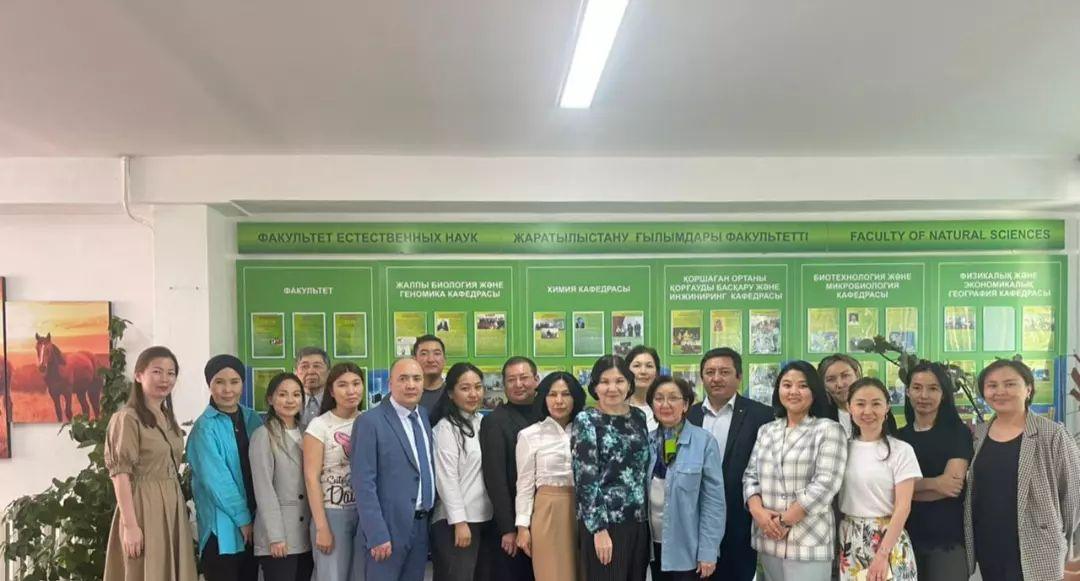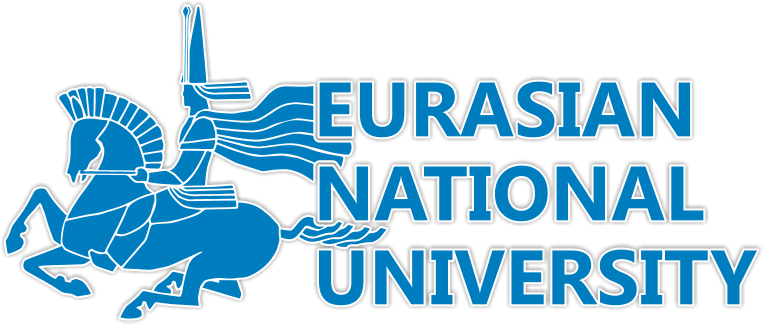
The Department of Biotechnology and Microbiology was established in May 2011 on the basis of the Department of Biology and Biotechnology. The first head of the department was PhD, Professor Rustem Tukenovich Omarov, who headed the department until 2021. At the moment, the department is headed by Candidate of Biological Sciences, acting associate professor Masalimov Zhaksylyk Kayyrbekovich.
The mission of the department, as an educational and scientific unit of the university, carrying out educational and scientific activities is to train highly qualified, competitive specialists in accordance with international standards; to activate fundamental and applied research in the field of biotechnology.
The department implements bachelor's degree programs 6B05101 "Plant Biotechnology and Microbiology", 6B05102 - "Animal Biotechnology and Bioinformatics", magistracy 7M05103 – Molecular Biotechnology and Biomedicine, 7M05104 General and Applied Biotechnology
The staff of the department consists of 27 people, including 2 doctors of sciences, 16 candidates of sciences and PhD doctors, of which 4 professors, 15 associate professors and 5 senior teachers.
Among the teachers of the department there are 5 holders of the State educational grant "The Best teacher of the year", 3 holders of the International Scholarship of the President of the Republic of Kazakhstan "Bolashak".
The Department of Biotechnology and Microbiology annually participates in the ranking of educational programs in chemistry, repeatedly winning prizes. For 2021-2022, 3rd place in the Atameken rating, in 2020-2021, 2nd place in the NAAR rating.
Accreditation in the ASIIN Agency (Germany) confirms compliance with quality assurance standards in the European Higher Education Area ESG and the World Federation of Medical Education WFME, is included in the European Quality Assurance Register EQAR, is recognized by the European Association for Quality Assurance in Higher Education ENQA and the following world accreditation agencies: INQAAHE – International Network of quality Assurance Agencies in Higher Education; CHEA/CIQG – International Quality Group of the Council for Higher Education Accreditation in the USA; IREG – the International Observatory for Academic Ranking and Excellence; CEENQA – the Network of Quality Assurance Agencies in the Field of Higher Education in Central and Eastern Europe; APQN – the Asia-Pacific Network for Quality Assurance, AQAAIW - the Association of Quality Assurance Agencies of Education in the Islamic World.
The following Bachelor's degree program 6B05102 - "Plant Biotechnology and Microbiology" – was accredited by the independent accreditation and rating agency ASIIN for 5 years, the Master's program 7M05103 – Molecular Biotechnology and Biomedicine for 5 years. All of the above accredited OP are included in the DEQAR register, so our graduates can continue their studies or get a job in Europe, Asia, America.
One of the components of success is the high publication activity of the teaching staff. Over the past 3 years, more than 40 articles have been published in journals included in the Web of Science, Scopus databases, more than 7 professors and associate professors of the department have a Hirsch index of more than 3.
The department conducts fundamental and applied research in the following areas: oxidative stress of plants, mechanisms of RNA interference, the influence of environmental stress factors on plant development, peculiarities of growing hydrobionts in the aquaponic system, the study of salt stress in plants, fish molybdenum enzymes.
Classes are held in three languages (Russian, Kazakh, English). The incoming academic mobility of students is widely developed, so over the past 2 years, 3 citizens from Russia have been studying, and students have also studied at universities of the Republic of Belarus, France, Russia, Japan, Armenia, Romania, Poland, Turkey, the Czech Republic, Latvia, Finland on outgoing mobility. Our professors have lectured at universities in Spain (University of Seville, Seville), the University of Natal in Pietersmaritzburg, South Africa. The research was carried out at the scientific centers of Ben-Gurion University at Beersheba, Israel, the Pushchinsky Scientific Center of Biotechnology of the Russian Academy of Sciences (PNC RAS), the A.N.Bach Institute of Biochemistry (Russia), the Institute of Genetics in Gatersleben (Germany), at the University of Bayreuth (Bavaria).
Classes are conducted not only by the faculty of the department, but also by invited foreign scientists Dr. Timur Yunusov, Marat Saparbayev, Dos Sarbasov.
The professors of the department are members of the editorial board of the Bulletin of the Eurasian National University. Biological Sciences series.
Operational plan of the Department of Biotechnology and Microbiology for 2023
Operational plan of the Department of Biotechnology and Microbiology for 2022
Operational plan of the Department of Biotechnology and Microbiology for 2021-2022
Annual report on the activities of the department 2021-2022
Annual plan of the department for 2021-2022
Annual plan of the department for 2022-2023
Bachelor degree:
6B05101 - "Plant Biotechnology and Microbiology"
Object of Professional Activity
Application of cell and tissue cultures for clonal micropropagation and improvement of plants, cell selection, experimental haploidy; use of molecular and biochemical markers in plant breeding, genetic reconstruction of plants on the basis of methods of cellular and genetic engineering of plants, industrial production of valuable biologically active substances and biological products of plant and microbial origin, biotechnology to create diagnostic and preventive means of plant disease control; operation and quality management of biotechnological productions, the organization and carrying out quality control of raw materials, intermediate products and finished products, pedagogical activity in secondary educational institutions.
6B05102 - "Animal Biotechnology and Bioinformatics"
Object of Professional Activity
Obtaining, studying and application of various biological objects, first of all, modified natural and artificial organisms (from viruses and unicellular to multicellular), as well as biomacromolecules; processing and subsequent analysis of a large array of information on biological objects (decoded genomes, spatial structures of biomolecules, interaction of biological objects); production technologies using biocatalysis, cellular and genetic engineering; operation and quality management of biotechnological production, in compliance with the requirements of national and international regulations; organization and conduct of quality control of raw materials, intermediates and finished products, training in bioengineering and bioinformatics and related disciplines in educational institutions.
Master degree:
7M05103 - "Molecular Biotechnology and Biomedicine"
The object of professional activity
Biological, bioengineering, biomedical, environmental technologies; biological assessment and monitoring; Instruments and methods used microorganisms, cell cultures derived from them, and using the substances in laboratory and industrial settings; regulations on the production of biotechnology products, international standards, regulatory, design and technological documentation; database technology, technical nature; environmental monitoring data and biological safety of the environment.
7М05104 - "General and Applied Biotechnology".
The object of professional activity
Рroduction, research and application of enzymes, viruses, microorganisms, cell cultures of animals and plants, products of their biosynthesis and biotransformation; production technologies with use of microbiological synthesis, biocatalysis, genetic engineering and nanobiotechnologies; devices and equipment for the study of the properties of microorganisms used, cell cultures obtained with their substances in the laboratory and industrial conditions; installation and equipment for biotechnology processes; quality control of raw materials, semi-finished products and finished products; means of environmental assessment and protection from the effects of industrial production.
